How Do You Say 'Cheesecake Factory' In Mandarin? Behind the Scenes of Life in the Chinese Basketball Association

Sports Illustrated’s annual “Where Are They Now?” issue catches up with the stars and prominent figures from yesteryear—past features have included Sammy Sosa, Brett Favre, Dennis Rodman, Tony Hawk and Don King. The 2019 issue features an inside look into the new life of Alex Rodriguez, Yao Ming’s mission for Chinese basketball and more.
For more great storytelling and in-depth analysis, subscribe to the magazine—and get up to 94% off the cover price. Click here for more.
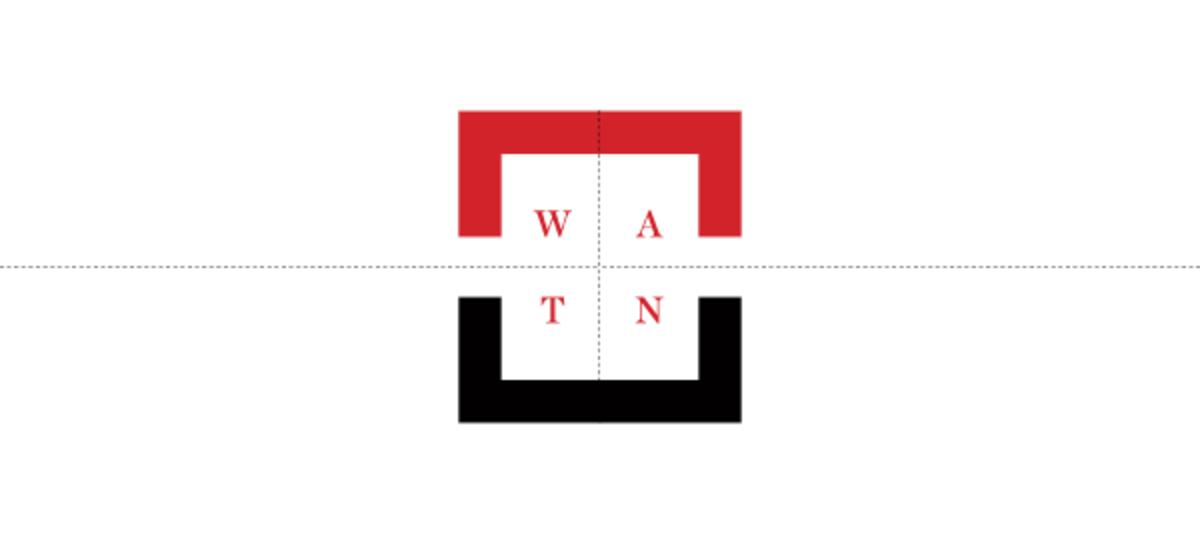
To escape the troubled world they had first left men's society
They live as if become immortals, no reason now to return
"Peach Blossom Journey"
—Wang Wei, eighth century, Tang Dynasty
Many more famous players have followed his path, but one of the first Americans to join the Chinese Basketball Association was a 6'8" rebounding machine named John Spencer, who signed a $20,000-per-month contract before the league's second season, in August 1996, to play for a team owned by a steel company. "I have no idea why I did it," he says now. "I don't know if you want to call me a pioneer or an idiot."
Each day of training camp with the Jiangsu Dragons began with a two-mile run at 5 a.m., followed by weightlifting using cinder blocks affixed to bamboo poles. In winter Spencer, then 30, wore gloves and a parka for practice at the arena, which lacked heat. He once requested electrical-stimulation treatment for his sore knee. The trainer returned with an acupuncture needle, a car battery and jumper cables.
Today Spencer operates a North Carolina--based basketball agency that occasionally places clients in China. The country's top league has professionalized over the years, especially under the recent leadership of chairman Yao Ming, and American talent is taking notice: Players with a collective 11,000-plus games of NBA experience passed through the CBA last season, including 10 McDonald's All-Americans, five NCAA champions and 19 first-round picks.
That list of imports makes for good bartrivia fodder (Q: Which former NCAA Player of the Year wears the crimson-and-gold of the Zhejiang Golden Bulls? A: Tyler Hansbrough), but the CBA is far from trivial. Certain players head west to rehabilitate their skills, if not their reputations. Some hope to ride out their days cashing paychecks in the smoggy sunset. Still others come seeking a gateway to a stable career overseas. They are spread across 20 teams spanning a dozen provinces and three municipalities, from China's iridescent seaside cities to remote outposts like Ürümqi, 400 miles from the Kazakhstan border. But they are all bonded by a shared experience.
Spencer remembers his introduction: the dorm room with its thin mattress on a wooden platform; his only possessions a Bible, a chessboard and a CD player. "I'd been in that place for eight weeks, lying in a fetal position, calling home like, 'Mom. Dad. What am I doing?'" he says. "Then this 6'9" guy walks into my room."
The new arrival, Kennard Robinson, had played for John Calipari at UMass. When Spencer bounded from his bed and wrapped this fellow expat in a bear hug, Robinson was taken aback. "What's wrong with you?" he asked.
"Nothing," Spencer replied. "You've just got to be here to understand."
Fifteen stories up at the InterContinental Taiyuan, six hours southwest of Beijing, a hotel door opens to reveal 6'6" Shabazz Muhammad in a plain white T-shirt and polka-dot boxers. Freshly awake from a pregame nap, the 2013 NBA lottery pick plops down on a couch. Around him, clothes and sneakers spill out of suitcases; a table sits cluttered with survival essentials—pistachios, instant oatmeal, PB&J fixings, two bottles of red wine. A flatscreen is tuned to the Discovery Channel, where a stranded adventurer furiously tries to start a campfire.
The choice of programming is fitting given the description Muhammad, 26, offered earlier of Taiyuan: a place, basically, best survived in a hotel room, like some high-rise castaway. "There isn't really nothing to do in this city prob the worst in the CBA," he'd texted. "Not even any food places smh." Another message of lament was punctuated by three waterfall-tears emojis.
It's a bleak portrait compared to Muhammad's early impressions of the country. In 2017 he visited with the Timberwolves for a pair of exhibitions. He fondly recalls strolling Shanghai's silk markets alongside Karl-Anthony Towns and Andrew Wiggins, hunting for knockoff designer goods. Two years later Muhammad inked a one-year deal with the Shanxi Loongs, expecting a similar lifestyle for himself and girlfriend Khrystyna Olenchuk. "It's going to be really dope," he thought.
Reality quickly set in. On the ride from the airport in Taiyuan, a mainstay on any list of the world's most polluted cities, Muhammad could barely see the road through the soot-caked windows. "I'm ready to go home," he told Olenchuk.
The Loongs did little to change that attitude. Before his debut Muhammad noticed a strange visitor in the locker room, smoke billowing from his cigarette. "Who is this guy?" Muhammad asked. Turns out it was the team president, irate over a string of L's. "He was like, 'If we lose, everybody has to cut their hair,'" Muhammad says. "I thought it was a joke." At the next practice, though, all of the team's Chinese players and coaches showed up with freshly shaved heads.
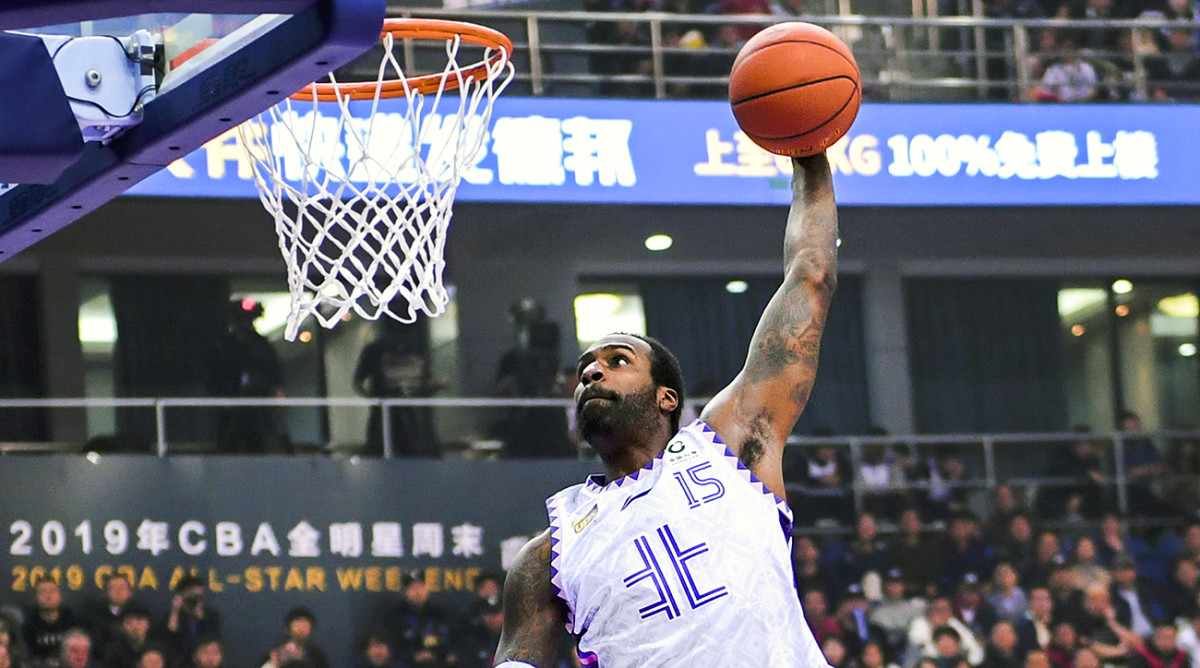
It's easy to see a hard fall here for someone of Muhammad's pedigree. Named Mr. Basketball USA in 2012, he spent a season at UCLA before being drafted with the 14th pick. It's possible he'd still be in Minnesota had he not grown frustrated by a string of DNP-CDs and insisted on being released from his guaranteed contract in March '18. "I should've stuck it out," he laments. "Pouting, that's what got me out of the league."
And how he wound up at Taiyun's Riverside Sports Arena, a 5,331-seat building with airplane-hangar ceilings. It's early March and the Loongs are hosting their regular-season home finale, against the Shandong Golden Stars. Rap music thumps as Shanxi's mascot, a paunch-bellied blue dragon, wanders around without its costume head, schmoozing with sequined cheerleaders. A dozen security guards lord over a section of superfans, hoping to prevent a repeat of a recent brawl. The game starts, though, and a series of questionable calls has the throng yelling at the referee in Chinese: "S----y! S----y!"
These chants are translated by one of Shanxi's two interpret-ers, a young man who introduces himself as Brady, a nickname attributed to his worship of a quarterback who plays 11,000 miles away. "Six rings," Brady says, raising that many fingers.
Muhammad kisses a first-quarter floater off the backboard and Brady leans over, invoking another G.O.A.T.: "Left-hand Jordan." Despite the Loongs' place near the bottom of the standings, Muhammad has thrived in the CBA, improving his physical conditioning and three-point shooting while leading the North Conference with 28 points at the All-Star Game in January. Brady cues up a cellphone picture from this season, against the Liaoning Flying Leopards, when Muhammad posterized point guard Guo Ailun, a Chinese national team star and the only native player with an Air Jordan shoe deal. "Dunk on his face," Brady says. After that play, he notes, fans started referring to Muhammad as "God."
Seated beside Brady is Olenchuk, for whom life in Shanxi has its own challenges. Early in her stay she noticed clumps of her long, black hair were falling out, which the Loongs' doctor told her was a possible side effect of the air pollution. Even then, she sees the silver lining of China for Muhammad. "In the NBA he wasn't himself," she says. "Would you rather sit on the bench and have that little title, or do what you love?"
She brings up a recent visit to the Mengshan Giant Buddha, a breathtaking, 200-foot-tall statue that was chiseled into a mountainside 1,400 years ago. Along the winding walk to the summit she and Muhammad stopped inside a Buddhist temple, lit incense sticks, knelt on a zafu cushion and, heads bowed, prayed for good fortune throughout the season.
Yes, China has its share of headaches. And yet, says Olenchuk, "He's a lot happier here. A completely different person."
With 54 points from former Nuggets/Rockets/Pacers point guard Ty Lawson, the Golden Stars pull away as Muhammad watches from the bench, subbed out midway through the fourth. (To promote homegrown talent, each team is allowed just two non-Chinese players, only one of whom can stay on the floor in the last period.) Later, accompanied by Olenchuk and fellow American import Bobby Brown, he steps outside the players' entrance, where security guards have set up a perimeter around a minivan, obstructing an ever-replenishing horde of selfie-seeking fans. A path clears. The Americans climb aboard, and the door slides shut.
Two more games remain, both in Beijing (after which Muhammad will fly straight home to Las Vegas). "See ya, Shanxi," he says under his breath, as the van pulls away into the night, "wouldn't wanna be ya."
The four-hour bullet train from Taiyuan to Jinan, capital of the neighboring Shandong province, winds through mountain passes and dusty prairies, whips past terraced fields and deep ravines. Every so often, though, a thicket of high-rise apartments appears in the distance, shooting up from the horizon like the bristles of a laid-flat toothbrush. Together these thickets are a reminder of the roaring economic climate in a country that can build whatever and wherever it wants, as fast as it damn well pleases.
This boom has reached basketball too. Silk and porcelain may have enticed medieval explorers to the Middle Kingdom, but today's great ballers of China are mostly coming over for the paper. One CBA agent estimates the league's imports earn an average of $1 million per season, with some salaries climbing close to $3 million—and because clubs cover the income tax, that entire amount goes straight to the bank.
The potential for supplementing this cash stream is high. Contracts are typically laced with incentives, for anything from road victories to double-digit rebounds. And that's before considering the business opportunities that come with a country that has more casual basketball fans, according to NBA China, than the entire population of the U.S. Besides, it's not a bad life. Imports typically stay in five-star hotel suites or furnished apartments. They're assigned translators and car services, and they tend to fly first-class (while domestic teammates are relegated to coach). It isn't uncommon for a front office to cover family members' expenses on road trips.
"They get treated well," says Brian Goorjian, who played at Pepperdine and has spent the past decade coaching in the CBA. "The word's out: Hey, guys, get to China."
Getting there is one thing. A Euro- or G-League résumé is good; an NBA pedigree is better; a Chinese agent is mandatory. Thriving there is an entirely different proposition. From frequent travel disruptions to subpar team medical care to a dearth of Western food (beyond fast-food chains like KFC), players accustomed to cushy NBA amenities are tested daily.
"I could name four or five players who had that pedigree and came over, went through the motions—no relationships with teammates—and it's just a bust," says Goorjian. "Some imports survive. Others get spit out."
On that subject: Hop off at the train station outside Jinan, home of the Golden Stars. Find Lawson, back in town after the Shanxi game. Ask about the shrine.
Maybe shrine isn't the best word, but that's what he calls it. Really, it's just an ordinary changing stall in the Shandong locker room. As Lawson explains, the team had suffered a series of bad import experiences by the time he joined in August 2017, so players took matters into their own hands. No longer was anyone allowed to sit in the stall those misfits had rotated through; instead it was filled with oranges, apples, water bottles, candy bars and other offerings. "They were like, 'This player sucked so bad, we have to feed the spirit,'" Lawson says. "Like it's possessed."
It's nighttime in Jinan. As the 31-year-old strolls through an outdoor market, sipping lemon-green bubble tea, he seems to have avoided the wrath of the Chinese basketball gods thus far. An NCAA champion at North Carolina with 551 NBA games under his belt, Lawson played that first CBA season and then waited at home until early December, hoping that some NBA team would offer more than the veteran minimum. Only then did he rejoin Shandong. It wasn't a tough choice. "A lot of money to come out here," he says.
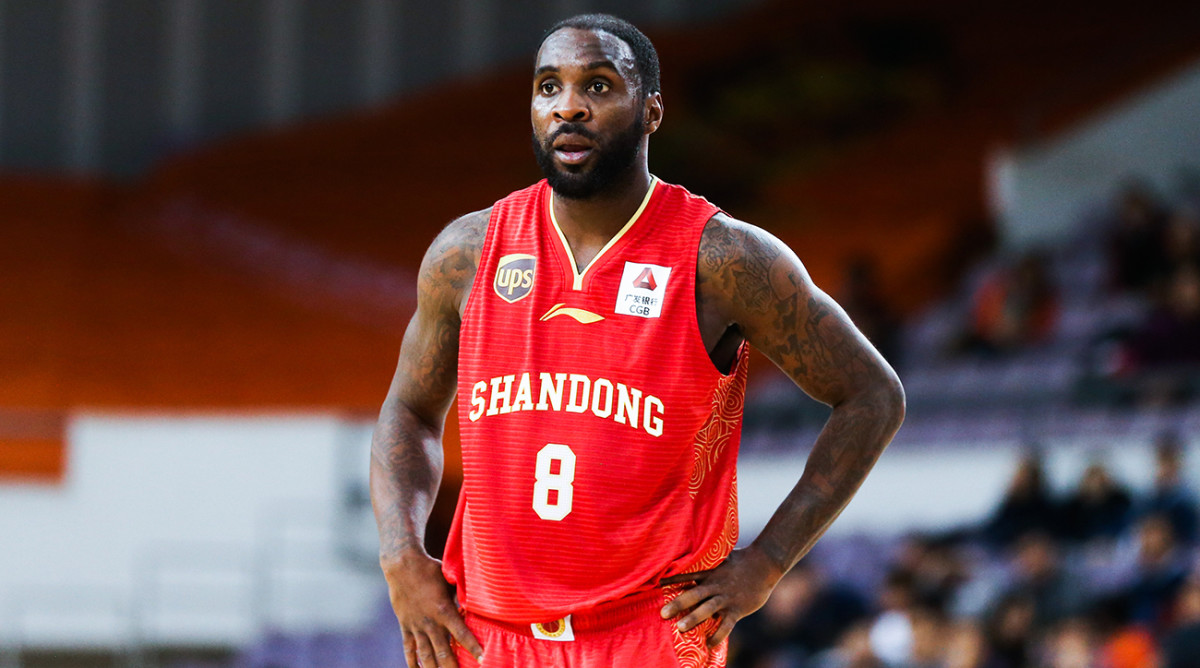
Not only is Lawson earning $2 million for a season that runs less than five months, but he's also been making inroads for his sports-themed slippers company, SLKRS. Earlier he hosted two Chinese businessmen to discuss selling his product on websites like Amazon and its Chinese counterparts. On a recent road trip he broke off to visit the factory his company uses, in Guangdong Province. "China's treated me good," he says. "Life takes you in different ways. Just gotta roll with it."
Sure, there remain little annoyances. Like the fact that the CBA is exclusively sponsored by a native sportswear conglomerate, LiNing, so any other sneaker logo must be covered with tape during games. There was that time Lawson refused to practice because a road arena had no heat. Before the Shanxi game he did his morning shootaround in Sambas and Marvin the Martian socks because the team's luggage had been lost.
But, spirits be damned, Lawson has fit in well. In the spring of 2018 he steered Shandong to the CBA semis, nailing a buzzer beater to win Game 6 before falling to Liaoning; and he developed a friendship with teammate Ding Yanyuhang, who spent 2018--19 in the Mavericks' organization. "One time we went to this barbecue spot," Lawson says. "He tricked me into eating cow tongue. I was so mad."
Ducking into a hibachi restaurant with his manager/roommate Nick Watkins, Lawson this time passes on the fried beef tongue (and the "secret cheese sweet potatoes," and the "comprehensive seafood Osaka fever" ...), settling instead for chicken and fried rice. As the grill sizzles, the old friends reflect on their early days in China. "It was a struggle," Lawson says.
"Second year," Watkins replies, "you know what to expect."
This inspires an idea in Lawson: "They need to have an American package: Here's your SIM card, your VPN. Some salt and pepper, some hot sauce to spice up your food. What else?"
Detergent, no doubt. After his first game in China, Lawson stripped off his jersey and wondered aloud where to toss the laundry. From across the locker room a teammate chucked a bar of soap at him and howled, in English, "Wash your own s---!"
"Those types of moments, you miss the NBA," says Lawson. The rise of two-way contracts back home has largely squeezed out a veteran middle class in favor of younger, cheaper talent, but Lawson rejects the notion that he landed here because he'd lost a step. "It wasn't about skill," he says. "It was about perception." By this he's referring to the "perception" of four DUI arrests, most recently in 2015, that left NBA teams leery about assuming further risk. "Don't want to get into it," he says, scooping up a bit of fried rice. "Pretty sure they're forgetting."
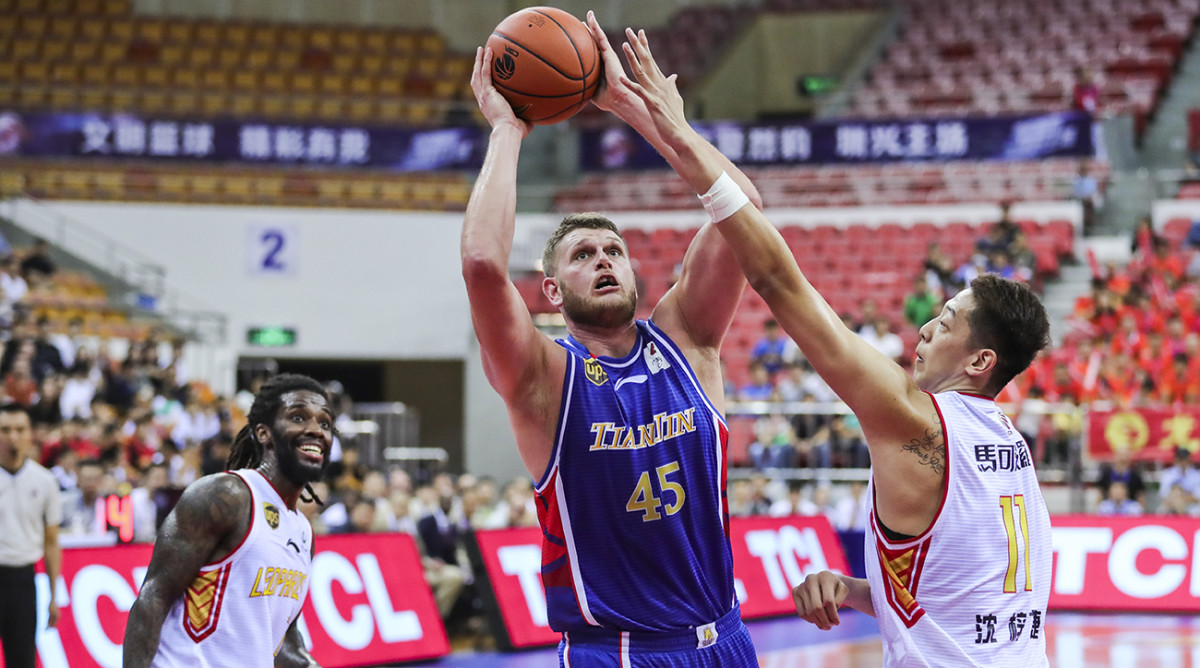
Cole Aldrich was confused. Earlier this season, his first in China, the 6'11" center reported to practice with the Tianjin Golden Lions feeling confident after a 14-point, nine-rebound performance, way better than his NBA averages. His new team wasn't as enthusiastic. When players split into positional work—bigs to one side, guards to the other—Aldrich learned he'd been assigned a personal-skills coach. That coach's task, as Aldrich puts it, "Teach me how to play in the CBA."
The instruction itself didn't inspire much confidence. Aldrich recalls being shown a complicated sequence to deploy against Chinese defenders—a fake baseline turnaround followed by two dribbles and a layup. "I was like, 'O.K., I'm not gonna use that; it's not a move anyone will fall for,'" he says.
The reality, for imports: Often it isn't cultural shock that gets them, but basketball shock. "Yo, you're in a different country," Lawson says. "You're not just coming over here and running s---." Lesson One: Brace for bruises. "It's definitely more physical," says Brandon Bass, who played in the NBA for 12 years, left for China in 2017 and promptly led Liaoning to a CBA title. "You learn that real quick."
The pace is also frantic—run-and-gun bordering on reckless. And because most imports are counted upon to shoulder the scoring load, they're the focus of every opponent's D. "I'd never been double- and triple-teamed the whole game," says Beijing Fly Dragons guard (and 2016 Sixers second-rounder) Pierre Jackson, who nonetheless averaged nearly 40 points this season.
Looming over all of this is a patience that quickly wears thin. Each CBA team is allowed to switch its imports up to four times before the playoffs, then twice more in the postseason. "If you're not performing at an incredible rate, you could easily be cut," says Bass.
Some survive. Others, like Aldrich, are spit out. After suffering a grade-two MCL sprain in December, he flew home to Minnesota and started rehab at the Mayo Clinic. Not only did the Golden Lions quickly sign a replacement import (CBA mainstay Andray Blatche, late of the Wizards and the Nets), they also stopped paying Aldrich's salary altogether, insisting he return to recover in Tianjin. After four months of missed payments, the matter went to arbitration in FIBA court.
But at least he gave China an honest effort. Before coming over, Aldrich even dialed up an old NBA teammate for advice. "Dude, you've been there a few years—just walk me through the experience," he said. "What does it look like?"
And lo, Jimo Dashen did reply....
The young Chinese man scrambles across a Shanghai metro car, climbing over suitcases and outstretched legs amid the late-afternoon commuter rush. He approaches with an awestruck stare. "Are you Jimmer Fredette? I'm a big fan. I watch your CBA games every night."
Leaning against the doors, Fredette nods and smiles for a selfie. By now, nearing the end of his third year with the Shanghai Sharks, public acts of adoration come with the territory. Even in this bustling city of 30 million, Fredette estimates that one-third of the population would recognize him. If true, he might be the most famous white dude here short of Colonel Sanders. Welcome to Jimmermania in Asia.
It wasn't always this way. Sure, there was his stardusted senior season at BYU, in 2010-11, when he became a single-name NCAA celebrity. But five years later, after a stint with the Knicks' D-League affiliate, Fredette was greeted by nothing more than low expectations and raised eyebrows in Shanghai. "Everyone was like, This is your import?" he says. "This is who you brought over?"
Attitudes shifted once Fredette started shooting. He finished that first season as the CBA's scoring leader, putting up 73 points in one game, and earned International MVP honors by leading the Sharks to the semifinals. After an offseason back in the U.S., Fredette flew again to Shanghai and this time was greeted at customs by several hundred fans wearing number 32 jerseys and waving flowers. Along the way he even earned a nickname, Jimo Dashen. Translation: the Lonely God.
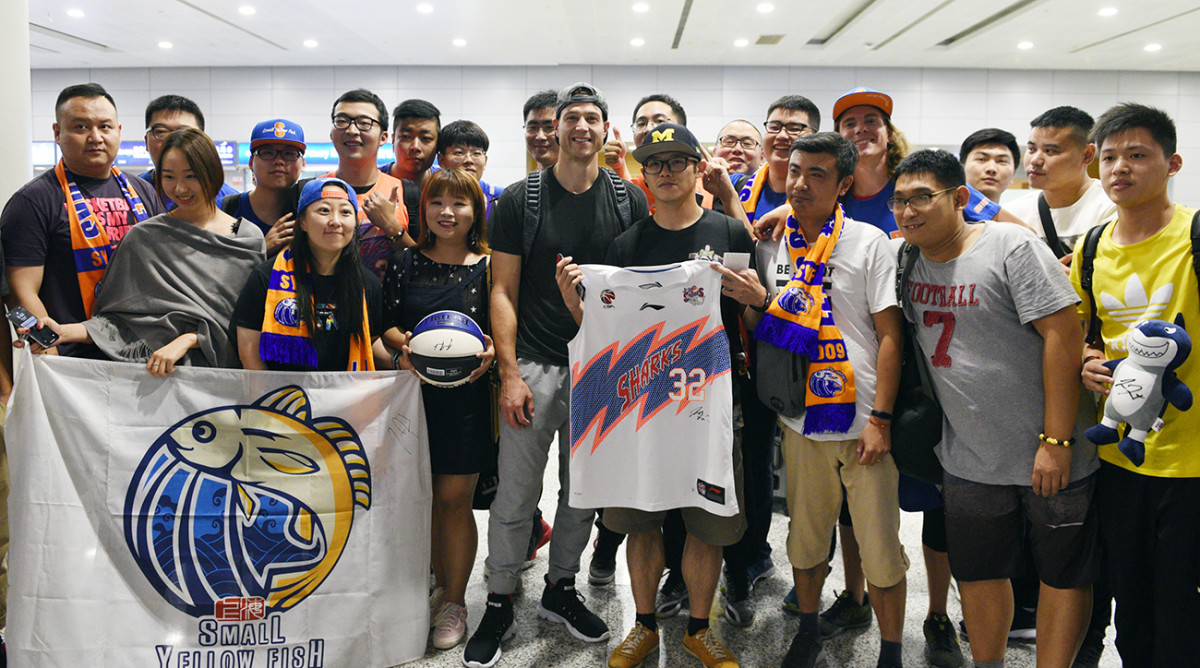
As an import, Fredette stands out most, though, by being human and blending in. His account on the Chinese social media app Weibo is filled with pics from trips to the Bund riverwalk; the Jing'an Temple; and, whenever daughter Wesley and wife Whitney are visiting from Denver, Shanghai Disneyland. During the Lunar New Year he exchanges digital hongbao, or red packets, with teammates; in return, they perform the grand Chinese tradition of smashing cake into Fredette's face on his birthday.
He stopped taking private Mandarin lessons but still uses some native phrases on the court, like lánb?an qiú ("rebound the ball") and huàn ("switch"). Obviously, one player also taught him all the important cuss words.
"They don't make you eat with the team," Fredette says, "but if you do want to be a part of that, they appreciate it. Including yourself in their culture goes a long way."
To that end, rather than slog through traffic in a car service, Fredette rides the metro to every home game, as he's doing on this afternoon in March, swiping his phone over the digital turnstile at the Line 9 station below his 16th-story apartment.
Sitting on the playoff bubble with only two games left, Shanghai is projected tonight to pummel the visiting Nanjing Monkey Kings, one of the CBA's worst teams (if not its coolest nickname). But the anticipation inside Yuanshen Gymnasium is high due to the presence of a special guest. Trailed by cameras and a boom mike, sporting a black jean jacket with Black Panther Party and Black Lives Matter pins, Kevin Garnett strides into the home locker room with some words of encouragement: "Kick some f------ ass. Know what it is?"
Turns out KG is a big Fredette fan too. Or, as he puts it, "I f---s with Jimmer. He definitely that deal." In town to promote a social media app, Garnett takes a seat at center court, daps up Fredette and spends the game lip-synching to the catchy tune that plays whenever the Sharks import scores: Teach me how to Jimmer, teach-me-teach-me how to Jimmer....
As Fredette heads to the bench with 38 points and a 105-70 lead, Garnett pounds his chest and throws up a fist in salute—then almost immediately leaves. Later, Fredette will express disappointment that they never met up after the game, but Garnett made sure to deliver a parting message through Jimmer's visiting brother, T.J., at halftime. "Don't let him start thinking this is all he's got," KG told T.J. "Give it two more years and he'll be ready. Just tell him to keep on that path. He's got more if he wants."
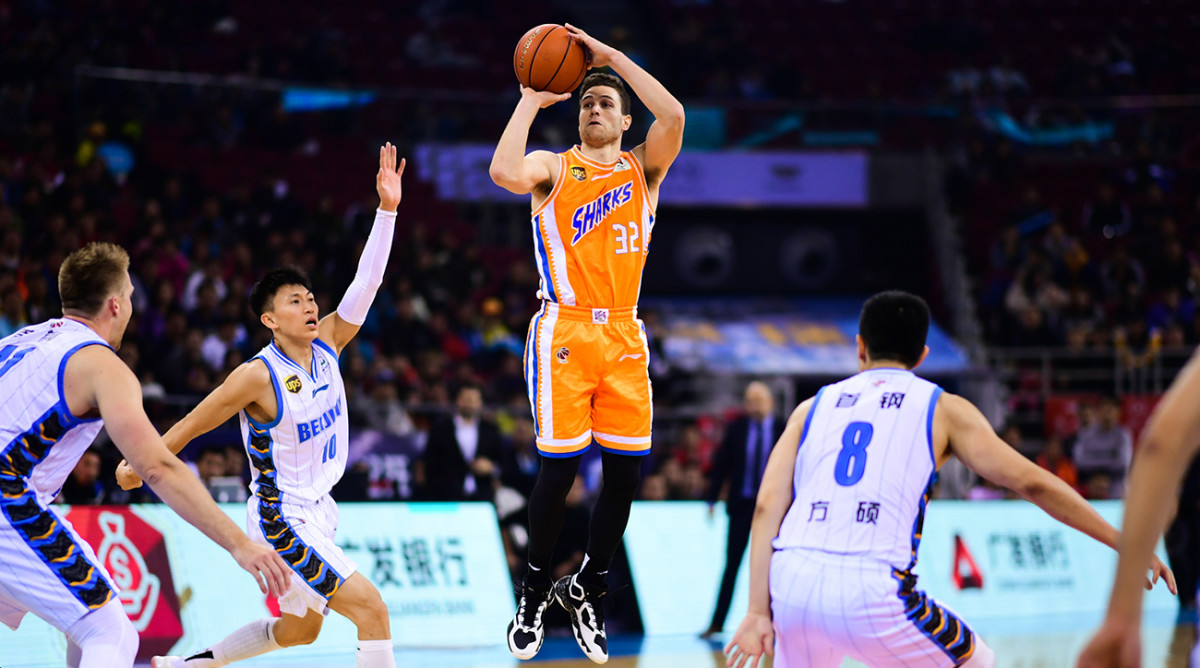
If he wants. With his CBA deal expiring at the end of the season, Fredette is approaching a crossroads. At first he embraced China with clear, honest intentions: Rehab a career beaten down by the bench. "I needed to get away to reinvent myself and find joy again," he says. But all ex-NBA expats are fueled by the same core conviction—I still belong—and here Fredette is no different. "It's as good a timing as it's going to be [to return]," he says. "I'm 30. Not many guys make the NBA, then come back after being out four years."
Besides, the Lonely God is ... lonely. Whitney is expecting their second child later this month. Wesley knows her dad mostly from FaceTime. "Part of him knows he can succeed in the NBA," T.J. says. "But the biggest aspect is family. He just wants to be there for his kids."
Already Fredette has gotten more out of the CBA than he ever imagined. He has sponsorship deals with a Chinese home-goods company, a language-learning app and Monster Energy. He's also the only current import with a sneaker deal; the Chinese company 361 has already released two editions of his Lonely Master line.
If it seems that there's little left for Fredette to accomplish in China, though, Johnson Wang disagrees. A swagger-filled, 27-year-old Shanghai native, Wang has worked off and on as the Sharks' translator, dating back to the days when his duties included escorting imports like Michael Beasley and Delonte West to Western nightclubs. He imagines a pinnacle. "If Jimmer ever leads us to a championship," he says, "he's definitely going to be the next Marbury."
Want to see what's possible in China? Head to the House of Marbury. Tucked along a coveted stretch of governmental real estate near Tiananmen Square, the self-proclaimed "micromuseum" opened in December 2015 thanks to an unlikely partnership between the Beijing postal service and the most successful American ever to pass through the CBA. As such, not only can visitors admire Stephon Marbury's footprints cast in shiny gold molds, they can also purchase state-sponsored stamps inspired by the star point guard.
A smiling mannequin awaits at the entrance, its bald wax head gathering dust beneath a spotlight. Detailed down to his biceps muscles and many tattoos, the fake Marbury wears a yellow number 3 jersey from the Fly Dragons, his fourth and final CBA stop before retiring in 2018. "It is an honor to be able to tell you my life story," reads a welcome message in both English and Chinese. "During my 13-year career in the NBA, I played for five different teams.... But nothing can compare to the experience I have had here in Beijing."
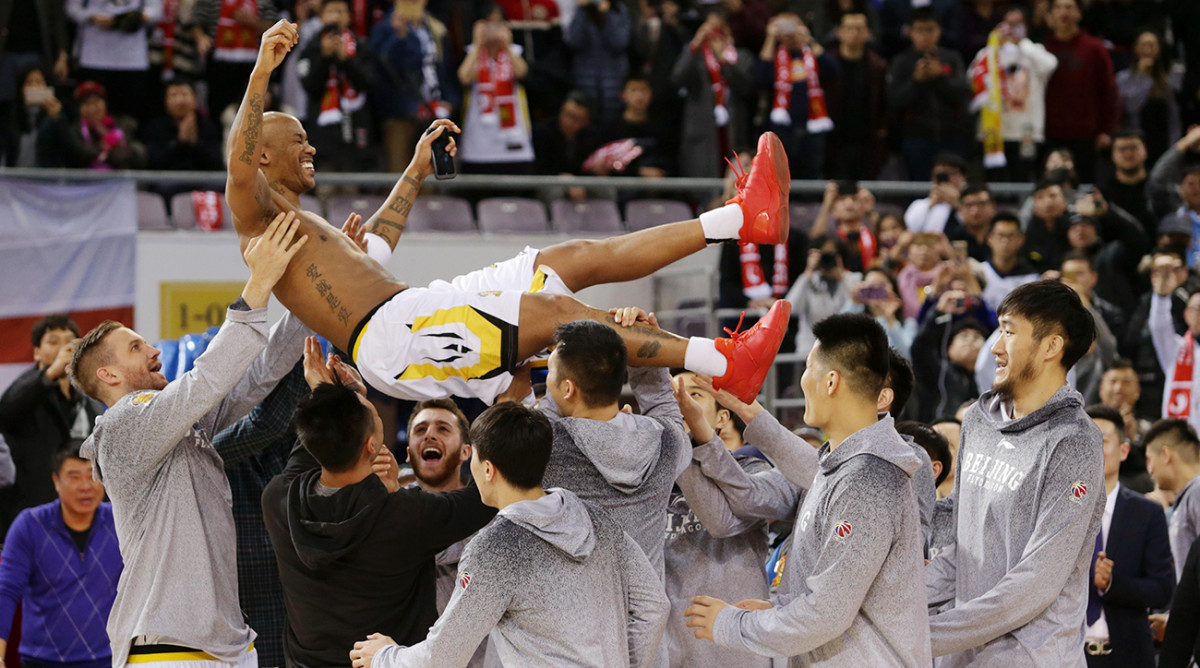
It's hard to imagine anything ever will, either. After winning the first of three championships in four years with the Beijing Ducks, the capital city's other CBA franchise, Marbury was swiftly elevated to living-immortal status. A statue was erected outside Cadillac Arena; a biographical musical was staged, starring the Coney Island native as himself; and the same week the House of Marbury opened, he became the first known foreign athlete to receive a Chinese green card.
Admission at the museum is free, though tours don't take long. Former Louisville guard Russ Smith recalls breezing through its single room of exhibits—trophies, framed articles and other memorabilia from Marbury's old house in Brooklyn—in half an hour on a road trip to Beijing in China's second-tier league. That night a friend brought Smith to a nightclub, "and it was just decked out with Marbury stuff," he says. "Knicks jerseys, Chinese jerseys, his sneakers. It's wild."
Marbury keeps an apartment in Beijing—last week he accepted a job there coaching his old team—and functions as a Yoda figure for new CBA imports, reaching out with advice. Smith was invited over for dinner; former NBA guards Pooh Jeter and MarShon Brooks got phone calls. Marbury's message: "The most important thing is to melt into the culture. Then you can have a better understanding of how the people operate. Everything is completely different from what you're used to."
Like Wang, Smith views Marbury as a symbol of potential. "There's a level of respect for Marbury that goes far beyond the CBA," says Smith, who reached the CBA this season with the Fujian Sturgeons. "That's been fueling my tank. I've seen what he made out of it. I want to have a legacy too."
Of course, others are happy just not to get spit out.
The Loongs end their disappointing season with two blowout road losses, but Muhammad feels optimistic about his future. "I don't mind coming back," he says. "I know the system now, so I can go to a better city and make a lot more money." As a gesture of gratitude before heading home, he and Brown want to treat their Chinese teammates to a truly American dining experience, so they reserve two big tables at the Cheesecake Factory and foot the nearly $3,000 bill. Muhammad: "Those guys acted like they never ate before. Brady ordered like four things."
Lawson had been hoping to latch onto an NBA team once the CBA season ended, but that doesn't happen after Shandong is swept out of the postseason's opening round in March. He sticks around long enough to revisit the slipper factory, posting video on Instagram of a conveyor belt churning out soles. He also appears to have learned from the beef-tongue incident. He captions another video: "They just tried to get me to try sheep dick bruh."
Lawson shouldn't feel too bad. Only two CBA imports this spring are fortunate enough to pivot back into NBA work: his teammate Donatas Motiejunas, who appears in five of the Spurs' seven playoff games, and Fredette.
After Shanghai squeaks into the playoffs but gets bounced by the Ducks, Jimmer finally gets the call to come home. Depleted by injury, the last-place Phoenix Suns plug the Lonely God into their rotation four days later—two years earlier than KG predicted. In six games off the bench he averages 10.8 minutes and 3.7 points but fails to hit on 13 long-range attempts. He passes along word through T.J., in a text: "Excited for the Suns opportunity. It's great to be back in the U.S.A. playing ball again with my family around."
But for how long? Last week, after Phoenix declined an option, Fredette signed a summer league deal with the Warriors. But he could easily be set adrift again before the fall.
If that happens, there's always China.
